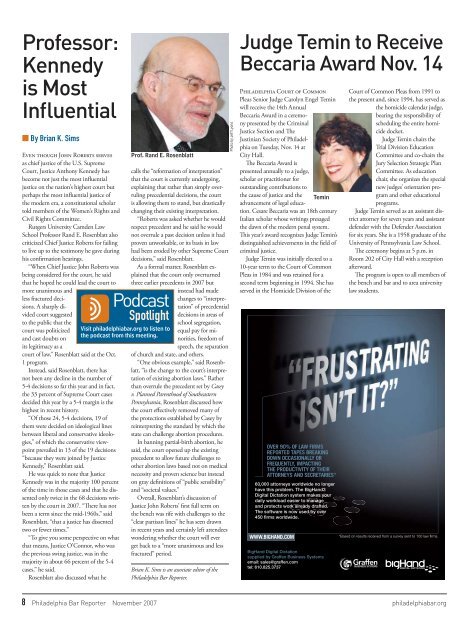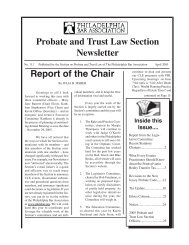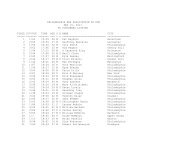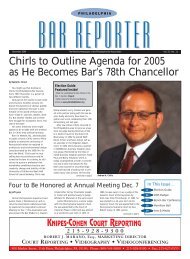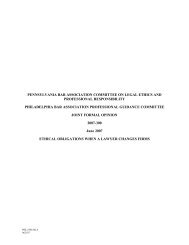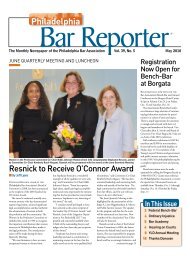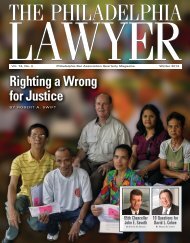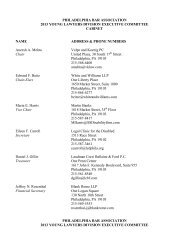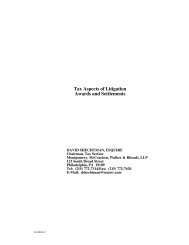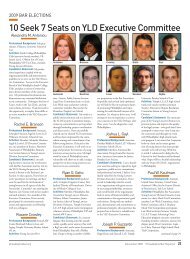November 2007 - Vol. 36, No. 11 - Philadelphia Bar Association
November 2007 - Vol. 36, No. 11 - Philadelphia Bar Association
November 2007 - Vol. 36, No. 11 - Philadelphia Bar Association
Create successful ePaper yourself
Turn your PDF publications into a flip-book with our unique Google optimized e-Paper software.
Professor:<br />
Kennedy<br />
is Most<br />
Influential<br />
n By Brian K. Sims<br />
Even though John Roberts serves<br />
as chief justice of the U.S. Supreme<br />
Court, Justice Anthony Kennedy has<br />
become not just the most influential<br />
justice on the nation’s highest court but<br />
perhaps the most influential justice of<br />
the modern era, a constitutional scholar<br />
told members of the Women’s Rights and<br />
Civil Rights Committee.<br />
Rutgers University Camden Law<br />
School Professor Rand E. Rosenblatt also<br />
criticized Chief Justice Roberts for failing<br />
to live up to the testimony he gave during<br />
his confirmation hearings.<br />
“When Chief Justice John Roberts was<br />
being considered for the court, he said<br />
that he hoped he could lead the court to<br />
more unanimous and<br />
less fractured decisions.<br />
A sharply divided<br />
court suggested<br />
to the public that the<br />
court was politicized<br />
and cast doubts on<br />
its legitimacy as a<br />
court of law,” Rosenblatt said at the Oct.<br />
1 program.<br />
Instead, said Rosenblatt, there has<br />
not been any decline in the number of<br />
5-4 decisions so far this year and in fact,<br />
the 33 percent of Supreme Court cases<br />
decided this year by a 5-4 margin is the<br />
highest in recent history.<br />
“Of those 24, 5-4 decisions, 19 of<br />
them were decided on ideological lines<br />
between liberal and conservative ideologies,”<br />
of which the conservative viewpoint<br />
prevailed in 13 of the 19 decisions<br />
“because they were joined by Justice<br />
Kennedy,” Rosenblatt said.<br />
He was quick to note that Justice<br />
Kennedy was in the majority 100 percent<br />
of the time in those cases and that he dissented<br />
only twice in the 68 decisions written<br />
by the court in <strong>2007</strong>. “There has not<br />
been a term since the mid-1960s,” said<br />
Rosenblatt, “that a justice has dissented<br />
two or fewer times.”<br />
“To give you some perspective on what<br />
that means, Justice O’Connor, who was<br />
the previous swing justice, was in the<br />
majority in about 66 percent of the 5-4<br />
cases,” he said.<br />
Rosenblatt also discussed what he<br />
Prof. Rand E. Rosenblatt<br />
Podcast<br />
Spotlight<br />
Visit philadelphiabar.org to listen to<br />
the podcast from this meeting.<br />
calls the “reformation of interpretation”<br />
that the court is currently undergoing,<br />
explaining that rather than simply overruling<br />
precedential decisions, the court<br />
is allowing them to stand, but drastically<br />
changing their existing interpretation.<br />
“Roberts was asked whether he would<br />
respect precedent and he said he would<br />
not overrule a past decision unless it had<br />
proven unworkable, or its basis in law<br />
had been eroded by other Supreme Court<br />
decisions,” said Rosenblatt.<br />
As a formal matter, Rosenblatt explained<br />
that the court only overturned<br />
three earlier precedents in <strong>2007</strong> but<br />
instead had made<br />
changes to “interpretation”<br />
of precedential<br />
decisions in areas of<br />
school segregation,<br />
equal pay for minorities,<br />
freedom of<br />
speech, the separation<br />
of church and state, and others.<br />
“One obvious example,” said Rosenblatt,<br />
“is the change to the court’s interpretation<br />
of existing abortion laws.” Rather<br />
than overrule the precedent set by Casey<br />
v. Planned Parenthood of Southeastern<br />
Pennsylvania, Rosenblatt discussed how<br />
the court effectively removed many of<br />
the protections established by Casey by<br />
reinterpreting the standard by which the<br />
state can challenge abortion procedures.<br />
In banning partial-birth abortion, he<br />
said, the court opened up the existing<br />
precedent to allow future challenges to<br />
other abortion laws based not on medical<br />
necessity and proven science but instead<br />
on gray definitions of “public sensibility”<br />
and “societal values.”<br />
Overall, Rosenblatt’s discussion of<br />
Justice John Roberts’ first full term on<br />
the bench was rife with challenges to the<br />
“clear partisan lines” he has seen drawn<br />
in recent years and certainly left attendees<br />
wondering whether the court will ever<br />
get back to a “more unanimous and less<br />
fractured” period.<br />
Brian K. Sims is an associate editor of the<br />
<strong>Philadelphia</strong> <strong>Bar</strong> Reporter.<br />
Photo by Jeff Lyons<br />
Judge Temin to Receive<br />
Beccaria Award <strong>No</strong>v. 14<br />
<strong>Philadelphia</strong> Court of Common<br />
Pleas Senior Judge Carolyn Engel Temin<br />
will receive the 14th Annual<br />
Beccaria Award in a ceremony<br />
presented by the Criminal<br />
Justice Section and The<br />
Justinian Society of <strong>Philadelphia</strong><br />
on Tuesday, <strong>No</strong>v. 14 at<br />
City Hall.<br />
The Beccaria Award is<br />
presented annually to a judge,<br />
scholar or practitioner for<br />
outstanding contributions to<br />
OVER 90% OF LAW FIRMS<br />
REPORTED TAPES BREAKING<br />
DOWN OCCASIONALLY OR<br />
FREQUENTLY, IMPACTING<br />
THE PRODUCTIVITY OF THEIR<br />
ATTORNEYS AND SECRETARIES*<br />
60,000 attorneys worldwide no longer<br />
have this problem. The BigHand3<br />
Digital Dictation system makes your<br />
daily workload easier to manage<br />
and protects work already drafted.<br />
The software is now used by over<br />
450 firms worldwide.<br />
WWW.BIGHAND.COM<br />
Temin<br />
the cause of justice and the<br />
advancement of legal education.<br />
Cesare Beccaria was an 18th century<br />
Italian scholar whose writings presaged<br />
the dawn of the modern penal system.<br />
This year’s award recognizes Judge Temin’s<br />
distinguished achievements in the field of<br />
criminal justice.<br />
Judge Temin was initially elected to a<br />
10-year term to the Court of Common<br />
Pleas in 1984 and was retained for a<br />
second term beginning in 1994. She has<br />
served in the Homicide Division of the<br />
BigHand Digital Dictation<br />
supplied by Graffen Business Systems<br />
email: sales@graffen.com<br />
tel: 610.825.3737<br />
Court of Common Pleas from 1991 to<br />
the present and, since 1994, has served as<br />
the homicide calendar judge,<br />
bearing the responsibility of<br />
scheduling the entire homicide<br />
docket.<br />
Judge Temin chairs the<br />
Trial Division Education<br />
Committee and co-chairs the<br />
Jury Selection Strategic Plan<br />
Committee. As education<br />
chair, she organizes the special<br />
new judges’ orientation program<br />
and other educational<br />
programs.<br />
Judge Temin served as an assistant district<br />
attorney for seven years and assistant<br />
defender with the Defender <strong>Association</strong><br />
for six years. She is a 1958 graduate of the<br />
University of Pennsylvania Law School.<br />
The ceremony begins at 5 p.m. in<br />
Room 202 of City Hall with a reception<br />
afterward.<br />
The program is open to all members of<br />
the bench and bar and to area university<br />
law students.<br />
*Based on results received from a survey sent to 100 law fi rms.<br />
8 <strong>Philadelphia</strong> <strong>Bar</strong> Reporter <strong><strong>No</strong>vember</strong> <strong>2007</strong> philadelphiabar.org


